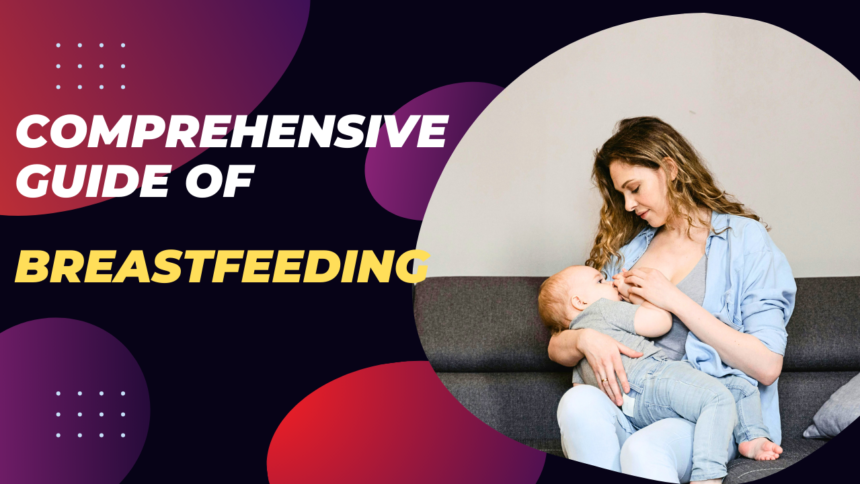“A newborn has only three demands. They are warmth in the arms of its mother, food from her breasts, and security in the knowledge of her presence. Breastfeeding satisfies all three.”
-Dr. Grantly Dick-Read
I. The Benefits of Breastfeeding
A. Health Benefits for Baby
- Boosted Immune System: Breast milk contains antibodies that help protect babies from infections and illnesses.
- Reduced Risk of SIDS: Breastfed babies have a lower risk of sudden infant death syndrome (SIDS).
- Proper Nutrition and Hydration: Breast milk provides the ideal nutrition for infants and helps keep them hydrated
B. Health Benefits for Mother
- Weight Loss: Breastfeeding helps mothers shed pregnancy weight by burning extra calories.
- Reduced Risk of Postpartum Depression: The release of oxytocin while breastfeeding can reduce the risk of postpartum depression.
- Bonding with Baby: Breastfeeding promotes bonding and emotional connection between mother and child
C. Environmental Benefits
- Zero Waste: Breastfeeding produces no waste compared to formula feeding.
- Energy Conservation: Breastfeeding requires no energy to produce or transport.
- Cost-Effective: Breastfeeding is free, saving families money on formula costs.
II. Getting Started with Breastfeeding
Properly initiating breastfeeding with correct latching techniques and establishing a routine is crucial for successful breastfeeding.
A. Proper Latching Techniques
- Positioning: Position the baby in a way that allows easy latching.
- Ensuring a Deep Latch: Help the baby latch onto the breast properly to avoid discomfort.
- Signs of a Good Latch: Look for signs like audible swallowing and relaxed cheeks.
B. Establishing a Breastfeeding Routine
- Frequency of Feeding: Newborns typically feed every 2-3 hours.
- Duration of Feeding Sessions: A feeding session usually lasts about 10-20 minutes per breast.
- Recognizing Hunger Cues: Learn to identify when the baby is hungry to avoid overfeeding or underfeeding.
C. Overcoming Common Challenges
- Engorgement: Apply warm compresses or express milk to relieve engorgement.
- Mastitis: Seek medical help if you develop symptoms like fever and breast pain.
- Sore Nipples: Use lanolin cream and ensure proper latching to prevent soreness.
Also Know: Spotting the Signs: Recognizing Danger Signs in Newborns
III. Nutrition and Diet for Breastfeeding Moms
Maintaining a healthy diet while breastfeeding is essential for both mother and baby’s well-being.
A. Foods to Eat
Hydrating Foods: Consume foods with high water content like fruits and vegetables.
Foods Rich in Omega-3 Fatty Acids: Include salmon, walnuts, and flaxseeds in your diet.
Foods to Avoid: Limit caffeine, spicy foods, and alcohol intake
B. Maintaining a Healthy Diet
- Caloric Intake: Aim for an extra 300-500 calories per day while breastfeeding.
- Balanced Nutrition: Include a variety of fruits, vegetables, whole grains, and lean proteins.
- Supplements: Consider taking vitamin D and iron supplements as recommended by your healthcare provider.
C. Impact of Alcohol and Caffeine
- Guidelines for Consumption: Limit alcohol intake and wait 2-3 hours before breastfeeding.
- Minimizing Effects on Breastfeeding: Pump and store breast milk if you consume alcohol or caffeine.
- Pumping and Storing Breastmilk: Use sterile containers and refrigerate or freeze expressed milk properly.
IV. Managing Work and Breastfeeding
Balancing work commitments with breastfeeding requires planning, communication, and dedication.
A. Creating a Pumping Schedule
- Planning Ahead: Determine your pumping schedule based on work hours.
- Pumping at Work: Find a private, clean space to pump and store milk.
- Storing Breastmilk Properly: Label and refrigerate/freeze expressed milk following guidelines.
B. Communicating with Employers
- Understanding Legal Rights: Know your rights related to breastfeeding at work.
- Discussing a Breastfeeding Plan: Communicate with your employer about your pumping needs.
- Creating a Supportive Work Environment: Advocate for facilities and flexibility to pump at work.
C. Maintaining Supply and Bonding
- Strategies for Pumping: Use a quality breast pump and maintain a consistent pumping routine.
- Balancing Work and Breastfeeding: Prioritize self-care and set boundaries to balance both roles.
- Tips for Reconnecting with Baby: Focus on quality time with your baby when together to strengthen the bond.
V. Self-care and Support for Breastfeeding Moms
Taking care of your physical and mental well-being is crucial while breastfeeding to ensure a positive experience.
A. Managing Stress and Fatigue
- Importance of Rest: Prioritize sleep and relaxation to recharge your energy.
- Self-care Practices: Incorporate activities like deep breathing, yoga, or walks for self-care.
- Seeking Help When Needed: Don’t hesitate to ask for support from family, friends, or healthcare professionals.
B. Joining Support Groups
- Online Communities: Join breastfeeding forums or groups for advice and camaraderie.
- Local Resources: Attend breastfeeding support groups or seek help from lactation consultants.
- Connecting with Other Breastfeeding Moms: Form friendships with other breastfeeding moms for mutual support.
C. Celebrating Milestones
- Tracking Progress: Record milestones like the baby’s weight gain or increased milk supply.
- Setting Realistic Goals: Create achievable breastfeeding goals to monitor progress.
- Recognizing Achievements: Celebrate small victories along the breastfeeding journey to stay motivated.
Summary
Breastfeeding is a unique and rewarding journey that offers a multitude of benefits for moms and babies. By understanding the essentials of breastfeeding, establishing routines, maintaining a healthy diet, managing work commitments, and prioritizing self-care and support, every mom can navigate the challenges and joys of breastfeeding successfully.
FAQs
How do I know if my baby is getting enough milk while breastfeeding?
Look for signs like weight gain, wet diapers, and contentedness after feeding.
Can I breastfeed if I have a medical condition or take medication?
Consult your healthcare provider to assess safety and possible alternatives.
How long should I breastfeed my baby before introducing solid foods?
The World Health Organization recommends exclusive breastfeeding for the first six months, with gradual introduction of solid foods thereafter.

Author
Dr Md Noor ALam Khan MBBS, DCH, DNB(Pedia)
A renowned and experienced pediatrician working as a consultant pediatrician in a multispecialty hospital. He is also active on social media platforms to educate the mass population regarding babies and kids’ health issues.






